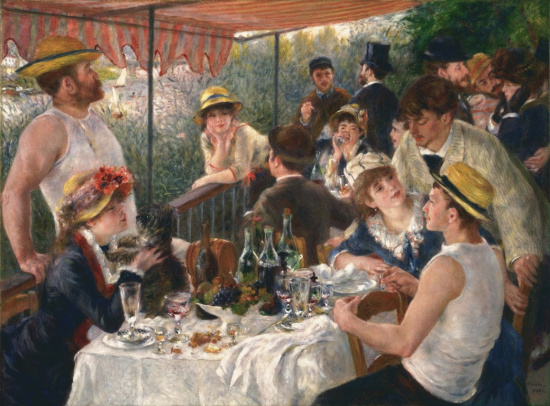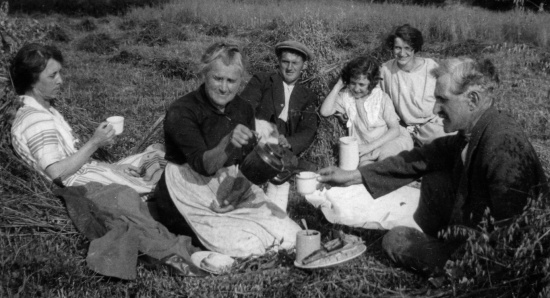Kitavans drink blood, Japanese eat rice, Africans and South Americans eat a lot more fruit, and Inuits eat whale blubber. They all have old people that are doing just fine and others not. We all die. The stress caused by fighting the good old macronutrient debate is enough to really make up for any negligible health superiority of either diet.
— Anonymous blogger on diet fads
Boating Party Luncheon (Pierre-Auguste Renoir)
If you enjoy eating, you’re probably doing something wrong. These days, it seems just about everything we put in our mouths is bad for us, and maybe the problem is that we just like our nosh too much. Like the Puritanical aversion to fun, simply taking pleasure in food means we’re bad people!
So, at least, just about every diet book published over the last couple of decades would have us believe. If we’re not suffering, restricting, eliminating or otherwise controlling our diets, we’re doing it wrong. Let’s see, we’ve been told to avoid: sugar and other carbohydrates, aspartame and other sugar substitutes, fat, protein, gluten, cholesterol, butter, margarine, salt, MSG, wheat, meat, cheese, wine, coffee, eggs, yogurt, cooked vegetables, garlic, fish, and of course anything tainted with GMOs. And if the food itself doesn’t get you, the stuff it’s packaged in will: Styrofoam, aluminum foil, polychlorinated biphenyl, perchlorate, tributyltin, benzophenone… (Unless you’re a speed reader, you could spend more time checking the labels than actually cooking and eating.)
Louisa and I lived in a group house in the 1990s, started 20 years earlier by a bunch of friends who enjoyed each others company every evening over dinner. By the time we moved in, everyone was on different diets or regimes, and—the ideal having given way to reality—we ate in ones and twos. Whatever happened to just enjoying food? Used to be, everyone would sit down with friends and family, relishing the simple pleasure of eating within the communion of our tribe. Now it’s all about catering for different diets and special needs, and counting calories (all undertaken, it seems to me, with the sort of religious zeal reserved by previous generations for crusades and witch hunts). Food labeling, meanwhile, has adopted an Orwellian approach, proudly announcing what’s not inside: Gluten Free! No MSG! No Artificial Preservatives or Sweeteners! Fat Free!
The title, Dodgy Diets, of my recent Field Notes column for the Journal pretty much sums up my jaundiced opinion of the whole mess.
Gluten
Take the current anti-gluten crusade. Yes, of course, I know that a few people – maybe 1 in 120 – have honest-to-god celiac disease, and for them, ingesting the slightest amount of gliadin – a gluten protein – is intensely painful and harmful. If an antibody test identifies you as having celiac disease, you need to cut out all wheat, barley and rye. (And you should get tested if you only SUSPECT gluten is a problem, since an estimated 80 percent of Americans with celiac disease have not been diagnosed.)
But now a $5 billion dollar a year industry is devoted to convincing the rest of us that there’s a vast population out here with non-celiac gluten sensitivity (NCGS), which some researchers doubt even exists. (Read past the first paragraph!) So little is known about NCGS that – if you suspect you have it and you’ve cut out gluten and are feeling better – it may not even be the gluten you’re sensitive to, but an associated carbohydrate group that goes under the acronym of FODMAPS: Fermentable Oligo, Di, Mono-saccharides And Polyols. (See this for foods containing FODMAPS).
And we humans are easily fooled. In study after study, researchers have found how fickle our bodies are after we’ve being primed what to expect. Fake drugs (sugar pills) for depression, acupuncture that doesn’t puncture the skin (while the patient believes it does), sham surgery, all have been shown to cure – sometimes as well as the “real thing.” It’s the well-known placebo effect.
Not so well known, the nocebo effect has the opposite impact. For instance, many lactose-intolerant volunteers, believing they were ingesting lactose (they weren’t) reported symptoms. Back to gluten: the best studies on gluten, at Monash University in Australia, have shown many people react negatively when they believe they’re eating gluten products (when they’re not). “In many circumstances non-celiac gluten sensitivity is an imaginary ailment that is caused by the nocebo effect of gluten ingestion,” according to a recent review.
Since gluten-free foodstuffs cost so much more than the equivalent gluten-containing foods – 242 percent according to one report – unless you’re Midas-rich, it’s worth knowing if your NCGS is real or you’re a dupe of those who benefit from your ignorance. (As I pointed out in a recent post, $14 billion-a-year Whole Foods Market may have more than your good health in mind when they promote gluten-free products.) And of course, if you do eliminate gluten from your diet, you’re probably going to be eating better anyway: no junk food, more home cooking and lots of fresh veggies!
That’s my Mum’s Mum and Dad on the far left and far right. Taken at the family farm “Llewyntew,” Caersws, mid-Wales, about 1923.
Bottom Line
IMHO, the Holy Grail of the Ideal Diet may forever elude us – and may not even exist. Bodies are just too complicated and variable. Meanwhile—the ultimate irony! – just worrying about what to eat and what not to eat may be making us ill (google orthorexia nervosa). Chances are (1) what you eat isn’t going to kill you, and (2) what you don’t eat isn’t going to cure you. So don’t worry, be happy.
Bon appétit!
###
Barry Evans gave the best years of his life to civil engineering, and what thanks did he get? In his dotage, he travels, kayaks, meditates and writes for the Journal and the Humboldt Historian. He sucks at 8 Ball. Buy his Field Notes anthologies at any local bookstore. Please.


CLICK TO MANAGE